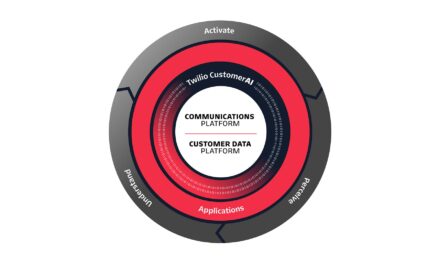Using AI, brands can transform unstructured data into actionable, relevant insights to drive business growth, combining organisational data from their business to proactively and appropriately personalise interactions.
The rise of always-on connectivity, availability of information, an influx of information channels, and the rise of digital natives – as the purchasing power of the younger generation grows – have led to consumers prioritising instant, personalised, proactive experiences above all else. In an era of information overload, every moment with customers – current and prospective – matters. Brands not only need to know who their audiences are, but also understand how they behave in a variety of situations and personalise their responses for the individual customer.
Customer experience (CX) outcomes can have a significant impact on the brand, affecting how they are perceived. It can also influence financial performance, with McKinsey research revealing that positive CX can increase sales revenue by up to 7 per cent.
It is essential for brands to be able to provide a consistent experience that goes beyond fixing a problem reactively. A solution may lie in the unstructured data that is collected throughout the customer journey from various touchpoints and interactions. Combined with insights from ongoing chatter taking place across online channels, this data may just be the most powerful tool in an organisation’s CX repertoire, when matched with the right resources such as Artificial Intelligence (AI).
Data Tells the Story
Brands are today dealing with an unprecedented volume of data that is growing exponentially, not residing on owned channels or platforms, and not in any organised format. IDC has forecasted global data volumes to grow at a compound annual growth rate (CAGR) of more than 20 per cent, reaching more than 221,000 exabytes by 2026, with the majority being unstructured.
Uncovering meaningful insights in an ocean of unstructured data is akin to finding needles in a field of haystacks. As their namesake suggests, unstructured data sets do not come in a standard format and often contain duplicate copies, making them difficult to sort, manage, and organise, let alone analyse. As a consequence, brands often make do with siloed data sets from that results in a fragmented view of the customer, negatively impacting CX outcomes.
To serve impactful personalised experiences, brands must create a unified, holistic view of their customers through an understanding of each individual’s past interactions with the brand across physical and digital channels. Using AI, brands can transform unstructured data into actionable, relevant insights to drive business growth, combining organisational data from their business to proactively and appropriately personalise interactions.

AI Holds the Key to a Customer-First Future
Gathering data from individual channels isn’t enough. The game-changer is the ability to extract meaningful information across all channels, and transforming it into actionable insights to engage effectively with customers.
Imagine the possibilities if Customer Relationship Management (CRM) systems could combine insights from all the different interactions that a customer has had with the brand with data from other public sources like forums or social media platforms. These are the channels where customers are interacting, indicating preferences, and sharing brand opinions, and is therefore essential to create a comprehensive 360-degree view of the customer.
Here’s where the transformation potential of AI comes in. The sheer volume and speed of data being generated makes it untenable for human teams to analyse in a timely or cost-effective manner. AI can provide potentially limitless value across the organisation, being able to interpret huge volumes of unstructured customer data, finding needles in haystacks to ensure that brands can recognize and understand every signal of customer intent.
Effective use of AI can help brands make sense of the data, to bridge what they know with the unknowns and act on it. At Sprinklr, we term this Proactive Care – the ability to pick up trends before they even happen. With customers today interacting with brands across various touchpoints, these insights can even be shared across different channels, enabling a truly omnichannel experience.
Other applications of AI for CX we have observed include:
- Analysis of customer data
- From call centre transcripts to social media posts, AI can help brands identify issues or problems with products or the brand. This enables brands to proactively resolve these challenges, reducing the overall customer dissatisfaction.
-
Better self-service tools
- AI-powered chatbots, FAQs, and other tools can enhance the ability of brands to quickly and effectively address various customer queries or issues by offering effective self-service options.
- Better customer support
- AI can empower customer service agents to effectively address complex customer queries or issues. Leveraging and integrating insights from multiple data sources, AI can provide context from similar events, suggest responses and courses of action most likely to succeed to increase the likelihood of a successful resolution. It can also analyse agent responses at scale in support of ongoing training and improvement efforts.
The Future of CX
As AI gets even more powerful and sophisticated, and more organisations increasingly embrace – and get serious about the importance of unified CXM – an AI-led approach to CX is set to be the new competitive differentiator in today’s digital economy.
From Sprinklr’s experience, enterprises can reduce CX costs by as much as 60% with the use of AI-powered bots and sales support, and create personalised CX that makes customers 80% more likely to convert.
Current trends are also creating optimal conditions for AI-powered CX experiences and services. This is especially in Southeast Asia, where conversational commerce – subset of e-commerce where customers interact and transact directly with brands via messaging apps – is contributing approximately US$12B to its booming e-Commerce market according to Sprinklr research. In markets like Singapore, 45% of internet users are engaging in conversational commerce, suggesting that the most successful businesses will be those able to harness AI to deliver impactful CX.


















